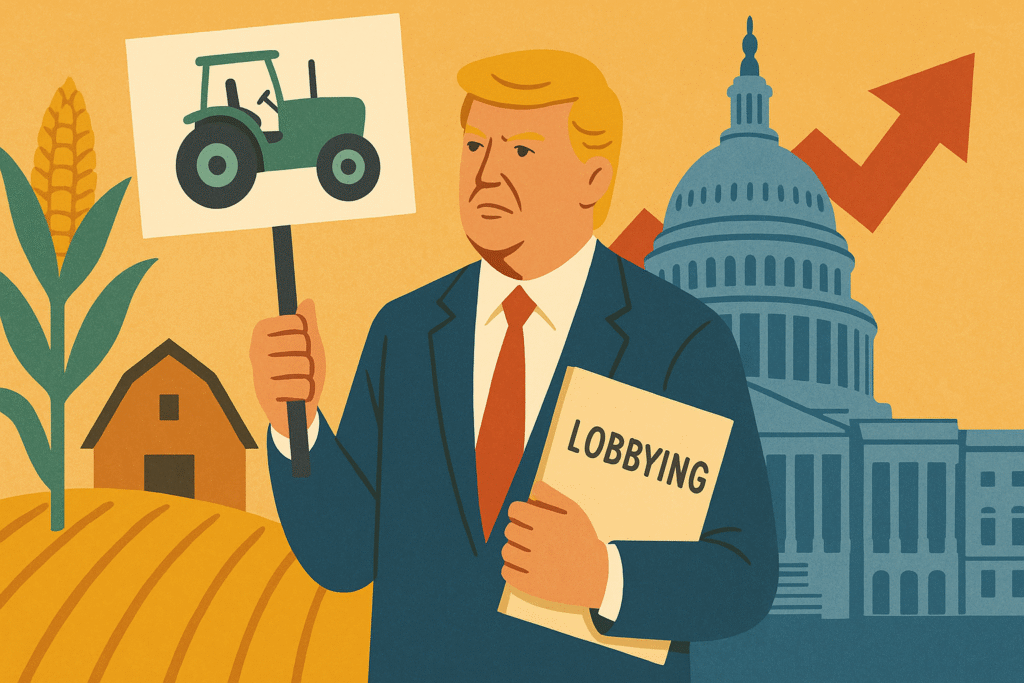American agricultural groups significantly increased their lobbying efforts in Washington during the first half of 2025, seeking protections and regulatory relief amid President Donald Trump’s intensified immigration crackdown.
According to disclosures filed with the U.S. Senate and compiled by the non-profit Open Secrets, agricultural organizations spent nearly $29 million on lobbying from January to June, up from $23 million during the same period last year. The surge in spending reflects rising concern among farm operators over access to labor and the costs of regulatory compliance, as well as efforts to shape trade and tax policy.
Farmers Caught Between Immigration Policy and Labor Shortages
Farmers, who rely heavily on migrant labor, are caught in a difficult position. Trump’s administration has doubled down on immigration enforcement, creating tension between his hardline immigration agenda and support for U.S. agriculture, two key constituencies in his political base.
“I’m the strongest immigration guy that there’s ever been, but I’m also the strongest farmer guy that there’s ever been,” Trump told Fox News in June.
Yet more than 40% of current farm workers lack legal immigration status, according to the Department of Agriculture. As fear spreads among undocumented laborers, farmers are turning increasingly to the government-regulated H-2A guest worker programme, despite long-standing concerns over its complexity and cost.
H-2A Programme in the Spotlight
The H-2A programme mandates that employers provide housing and pay an adverse effect wage rate (AEWR) meant to protect domestic workers’ wages. Many agricultural groups have criticized the AEWR as unsustainable.
“We’re having a hard time finding help, particularly for seasonal work,” said Jay Bragg, director at the Texas Farm Bureau, which spent $1.2 million lobbying this year. “People are beginning to look more and more to H-2A because there’s really no other solution.”
Lobbyists have made headway. The Biden-era rule requiring farms to extend certain labor protections to both guest workers and U.S. employees under H-2A was suspended last month, following industry pressure. Agriculture Secretary Brooke Rollins and Labor Secretary Lori Chavez-DeRemer have also indicated their intent to freeze or reduce the AEWR, citing economic strain on farms.
Broader Legislative and Trade Lobbying
Beyond labor, more than 30 agricultural organizations lobbied the administration on trade, particularly in light of Trump’s expanded tariff program. Farmers are concerned about both rising costs for inputs like fertilizers and the risk of retaliatory tariffs on exports, especially from China.
Ten organizations also lobbied the Department of Health’s “Make America Healthy Again” (MAHA) Commission, chaired by Health Secretary Robert F. Kennedy Jr., which is investigating the food industry’s impact on public health.
Additionally, many farming groups supported Trump’s “Big Beautiful Bill,” signed on July 4, which includes favorable provisions for key agricultural sectors such as soybeans, corn, cattle, and fertilizer production.
Shifting Advocacy Priorities
One agricultural lobbyist admitted that their organization had abandoned efforts to advocate for a path to legal status for undocumented workers, conceding that “we have no choice beyond H-2A” under the current administration.
John Hollay, director of government relations at the International Fresh Produce Association, confirmed that the lobbying effort was yielding results. “We’ve already seen some progress,” he said, pointing to cost-cutting changes to the guest worker system.
Outlook
As immigration and labor policy remain central political issues, farmers continue to navigate a complex landscape, relying on lobbying to secure relief and maintain access to a reliable workforce. With immigration enforcement tightening and economic pressure mounting, agricultural stakeholders are likely to continue increasing their political engagement in the months ahead.



